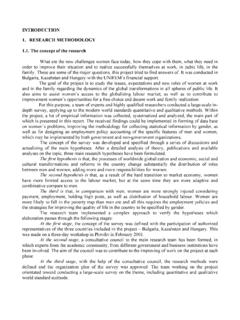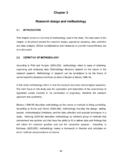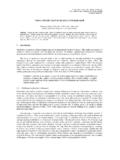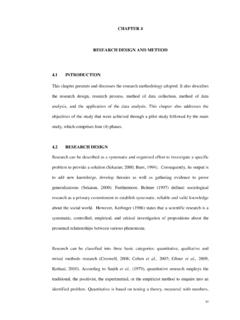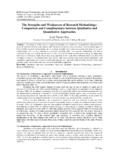Transcription of Chapter 4 Qualitative Research Methodology …
1 Chapter 4 qualitative research methodology introduction This Chapter is concerned with the methodological problem of how to integrate Qualitative and quantitative insights in developing an agent-based model of the e- commerce case study. Much agent-based modelling is carried out with very sparse data collection procedures, often focussing only on quantitative data collection. However, Qualitative techniques could be a very productive approach in this field of Research , since they produce primary data much richer in meaning and potentially insight. Combining methods in this way produces philosophical problems relating to the paradigm incommensurability' debate, which require some reflection in order to guard against pitfalls hindering the methodological approach.
2 In section these philosophical issues are discussed, and it is defined what is meant by Qualitative modelling' and by quantitative modelling' and how these can be distinguished. The problems of making quantitative data amenable to the formal techniques of modelling are challenging ones: these issues will be discussed at length in Chapter six. Section outlines some principles of case study Research , and the particular considerations that need to be taken into account in a management/organisational context. The area of application is information systems (IS) and interorganisational systems (IOS): an area that is coming to be recognised by managers to be of key strategic importance.
3 Starting from a broad problem definition - the question of how e-commerce impacts upon the supply chain it is argued that the Research methods were chosen because they suited the problem, and that this led to a novel multi- method design (described in section ). Section describes how a suitable case study was identified and how the Research objectives were established in collaboration with the industrial participants. The case study Research design is presented, the data collection methods are outlined, and the 75. topics for the fieldwork interviews are briefly discussed. It is shown that the case study is well integrated with the wider objectives of the Research .
4 Finally the stakeholder participation method, which was instrumental to the methodological approach, is discussed. The managers being familiar with the decision-making processes and with the participants involved, it was possible to sound out initial ideas and check their feasibility. They met the requirements of being interested in the Research , and seeing its value in understanding the substantive e- commerce issues. The stakeholders are referred to in section as well as throughout section However, a more detailed discussion of their roles in the organisation and influence over the Research agenda will be found in Chapter six. 76. Qualitative Methodology Qualitative Research Paradigms This section reflects upon some of the philosophical problems of combining Qualitative and quantitative approaches.
5 It discusses the issues of this Research at the epistemological and ontological levels, whereas the following sections will discuss more the methodological issues associated with the Research . The purpose of discussing the theoretical and philosophical assumptions is, as Garcia and Quek put it, to qualify the use of specific techniques in both the underlying assumptions guiding the Research and in the theoretical framework . (Garcia and Quek 1997, pg. 5). This level of critical awareness should ensure coherence over the Research process and avoid the dangers of stereotyping or distorting the actual methods used. In this section the Research paradigms adhered to by this investigation are stated and then assessed in terms of their feasibility for the Research objectives, the objectives of incorporating Qualitative and quantitative modelling of e-commerce in industry.
6 Finally I will comment on my own background and the significance of any bias that this might bring to the Research project. The main objection stems from the paradigm incommensurability' problem (Kuhn 1970), which suggests that combining different Research paradigms and comparing the results of each, is impossible. Discussing the underlying philosophical assumptions of Qualitative Research , Guba and Lincoln (1994) argue that these questions of paradigm are a fundamental starting point to guide Research inquiry, and should come before the choice of methods. The authors then set out four different Research paradigms (positivism, postpositivism, critical theory and constructivism), compare them in terms of their associated ontologies, epistemologies and methodologies, and then question whether or not it is possible to accommodate these views within a single conceptual framework.
7 Their 77. main argument is that, as far as subjectivists are concerned ( critical theorists and constructivists) the basic beliefs of these paradigms are incommensurable. In information systems (IS) Research this debate has some significance because it often cuts across different paradigms. Although traditionally IS researchers have taken a natural sciences approach ( positivistic), as they were working mainly in computer science, over the past ten years more interpretive methods have started to gain support in addressing questions about the sociological impacts of IS upon the individual, organisation or institution. There is a school of thought that believes that this paradigm incompatibility creates problems in identifying the nature of what is being investigated (ontology) and the nature of knowledge that can possibly be acquired (epistemology) (Nissen, Klein et al.)
8 1991). Basically this problem is rooted in the idea that although the technological capacity of IS can be evaluated in a positivistic way ( by making objective measurements, testing theories and making precise predictions), it does not necessarily imply that the social impacts can be assessed by the same means. On the contrary it may be advantageous to retain subjectivity in trying to understand some of these phenomena. This is why Qualitative methods are gaining popularity, since they are thought to promote multiplicity of viewpoints. For example, the introductory Chapter of a text on methods in social Research argues for Research as engagement in the system under investigation: The position presented in this work challenges this notion of objectivity, for it emphasizes the crucial link between observer and observed, and by implication, questions the very nature of neutral observation or evaluation.
9 (Morgan 1983, pg. 14). Qualitative is distinguished from quantitative Research by its concern with interpreting meaning in textual data and the spoken word, rather than in numerical data through use of statistical methods. This approach aims to capture the multiplicity of perspectives of social actors, and the meanings that those actors assign to events. The issue of Qualitative methodologies in IS will be returned to in section The rest of this section will describe my own Research background, the paradigms and 78. philosophical beliefs which underpin the approach taken, and will reflect upon how that might influence the outcomes of the Research .
10 Considering my background as a researcher trained in mathematics, computer programming and formal modelling, I am more familiar with the positivist approach to scientific enquiry. Validity, assumptions about the existence of objective facts' and presupposed theory to test' would normally be part of this framework. It is therefore essential that aspects of these traditions should be upheld in carrying out the formal side of the Research ( running repeatable simulations and analysing the results). However, it is clear to me that in trying to understand in any depth the social aspects of the case study there would also need to be flexibility in the Research to incorporate subjectivist points of view.

